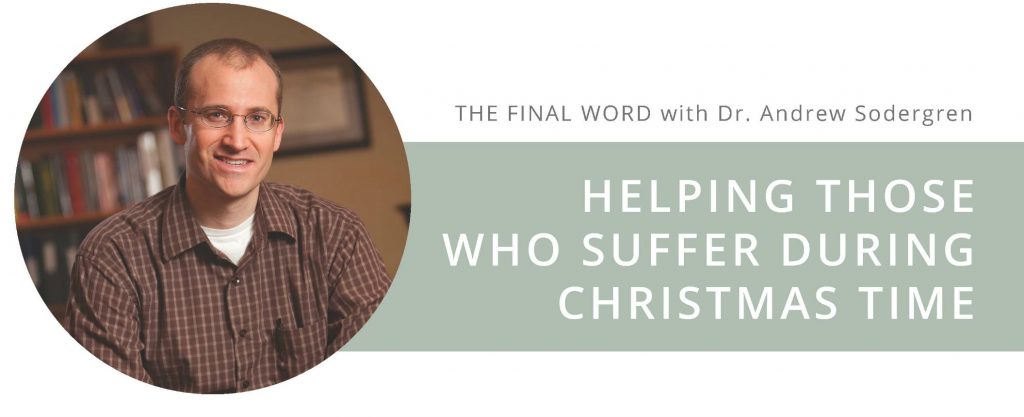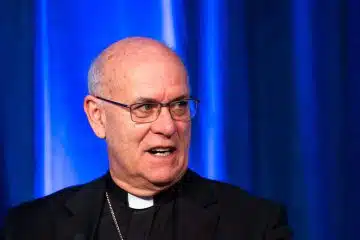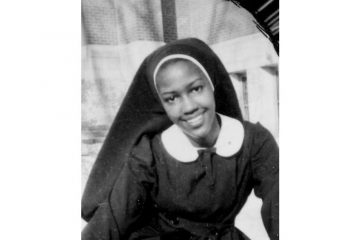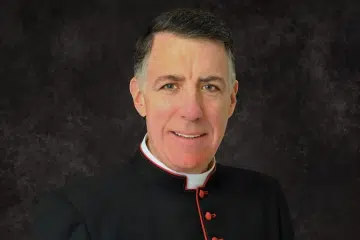The Final Word: Helping those who suffer during Christmas Time
 Caroling. Festive parties. Charming decorations. Cookies. Gift-exchanges. The message is all around us: We should be happy because it’s Christmas. Indeed, to be anything other than effusively joyful means running the risk of being labeled a scrooge. So, no matter what is going on in our lives – or in our hearts, we put on a happy face and try to blend in with the holiday crowd. To this, I say, “Bah humbug!”
Caroling. Festive parties. Charming decorations. Cookies. Gift-exchanges. The message is all around us: We should be happy because it’s Christmas. Indeed, to be anything other than effusively joyful means running the risk of being labeled a scrooge. So, no matter what is going on in our lives – or in our hearts, we put on a happy face and try to blend in with the holiday crowd. To this, I say, “Bah humbug!”
The reality is many people struggle this time of year for a variety of reasons: loss of a loved one, family conflicts or separations, miscarriage, isolation, depression, addictions, medical problems, financial challenges, and more. These crosses are hard to bear any time of the year, but they grow even heavier at Christmas. Indeed, the pressure to put on a happy face often makes things worse. It can leave a suffering person feeling more alone and even ashamed of their pain, afraid to reach out and possibly dampen someone else’s festive mood.
How can we help those (including ourselves) who are suffering this Christmas? For starters, we do well to recognize that joy and suffering, life and death all go together in this world marked by sin. We see this in our own experiences. How often major life transitions like getting married, moving to a new city, or retiring bring both joy and sorrow. How frequently the welcoming of new life into a family occurs close in time to the loss of a loved one. What’s more, our dearest, most fulfilling relationships can also be the source of our greatest pain.
We see this pairing of joy and sorrow in Christmas itself, which is where we also discover its meaning. In this great feast that we joyously celebrate, the Lord of Glory “emptied himself, taking the form of a slave, being born in the likeness of men” (Phil 2:6). We recall that, as the angelic choirs rejoiced, Jesus was born into utter poverty and rejection, in a cave with animals because no one would make space for Him. Indeed, Jesus’ whole life shows us that God does not delight in human suffering, nor does He avoid it. Rather, He enters into it with us, and, through it, He accomplishes His greatest miracles.
Jesus also shows us the gift we can be for others when we allow them the opportunity to encounter us in our moments of need. The Almighty Son of God allowed himself to be swaddled and cared for as a helpless baby. As a man, He and His disciples often relied on the generosity of others to provide for their needs. In his passion, the Creator of the universe allowed Simon to help Him carry His cross, Veronica to wipe His face and Joseph and Nicodemus to prepare His body for burial in a borrowed tomb. He who needs nothing from His creation, accepted their help humbly and blessed them each beyond measure.
As we celebrate the Nativity of our Lord, let us courageously acknowledge the sources of pain in our lives and open them to Him as an offering so that we can suffer with Him and He with us. Let us also make an effort to move beyond pleasantries with one another and sincerely make space to share how we are really doing. Taking the step of vulnerably sharing from the heart creates the possibility of a truly human encounter. We don’t have to have an answer or solution to each other’s pain. Rather, simply by listening attentively, showing understanding, and offering our time, support, and affection, we will be Christ for one another. In those moments, we allow the True Light, which is nothing less than the splendor of Love, to shine through us into each other’s dark places. This Christmas, rather than ignoring the darkness we all carry, let us light up the world one loving encounter at a time.
DR. ANDREW SODERGREN is a Catholic psychologist and director of psychological services for Ruah Woods, a Theology of the Body ministry based on the West Side of Cincinnati. He speaks to lay and professional audiences on topics related to the integration of psychology and the Catholic faith. He and his wife, Ellie, have been married 21 years and have five children.













